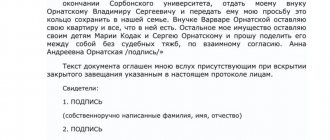A will is a kind of one-sided transaction, the condition of execution of which is the death (recognition as deceased) of the person who owns the inheritance and wishes to distribute it among his heirs.
But it is precisely the deferred execution of the transaction that opens questions about the validity period of the testamentary document and the acceptance of inheritance under it.
- Requirements for a will
- Duration of the will
- Validity period of a will for inheritance
- Consequences of missing the deadline for accepting an inheritance
- Restoring the deadline
- In what cases is it not necessary to restore the deadline for accepting an inheritance?
- Time limits for refusal to inherit under a will
- Statute of limitations for a will
Why was an inheritance agreement invented and how does it differ from a will?
It is no secret that after the opening of an inheritance, conflicts often occur in families. For example, the owner bequeathed an apartment to one son, and a car to another. At the same time, he also wanted his son to live in the apartment with his mother, and at the first request, the car would be given free of charge for transportation to his beloved nephew and his family, i.e. everything remained “as usual.”
The heirs may not have known about such conditions, or they knew, but did not want to fulfill them, since the requests were not recorded and this cannot be done in wills. In order for the will of the testator to be carried out, inheritance agreements were created.
An important difference between an inheritance agreement and a will is that the latter is a unilateral act. Unlike a will, an inheritance agreement is concluded by the testator and the heir. This allows the rights and obligations of the parties to be agreed upon in advance.
Restoring the deadline
The term can be restored both in court and out of court. In the first case, you will have to prove that the deadlines were missed for a good reason. It could be:
- ignorance of the death of the testator, provided that the heir really could not establish the fact of the opening of the inheritance;
- serious illness that precludes applying for inheritance personally or through proxies;
- long-distance business trip, participation in a field expedition, etc.
The main thing is that the court considers the reason valid. For example, ignorance of the legislation on the deadline for accepting an inheritance will not be considered a basis for reinstating the deadline. But a rare personal connection can be regarded as a valid reason for late application for an inheritance.
Due to frequent updates to legislation and the legal uniqueness of each situation, we recommend obtaining a free telephone consultation with a lawyer. You can ask your question by calling the hotline number 8 (800) 555-40-36 or write it in the form below.
An alternative to judicial restoration of the period for accepting an inheritance is conciliation. To do this, the heir receives written consent from other heirs who accepted the inheritance in a timely manner. He can explain to other heirs why the deadline was missed and whether the reason is really valid. The notary will simply formalize the inheritance according to the will, if the other heirs have expressed their written consent to this.
Who can be the heir under the contract?
Any person who may be called upon to inherit may be designated as an heir under the contract. The list of persons is specified in Article 1116 of the Civil Code.
Citizens who are alive at the time of opening of the inheritance, as well as those conceived during the life of the testator and born alive after the opening of the inheritance, as well as legal entities, the Russian Federation, constituent entities of the Russian Federation, municipalities, foreign states and international organizations can be called upon to inherit.
Those. under such an agreement, the inheritance under a condition can be transferred not only to citizens, but also to legal entities. For example, bequeath a collection of samovars to a museum, but only on the condition that they will be exhibited and not gather dust in storage rooms.
Key timing indicators
Regarding how long the prelegate is valid for the apartment, we can say unequivocally - it is unlimited. If it is drawn up correctly, competently, and in adequate condition, which is confirmed by a certificate, then the period for executing the will for housing is not limited. It will be relevant in 5, 10, 15 and even 30 years. It will lose its relevance only if the object of inheritance itself—the apartment—disappears. This is possible when a building is demolished, destroyed by a natural disaster, or written off from the city’s balance sheet as having expired. Another reason for the expiration of the validity period is the absence of heirs as such. This is possible due to their death or refusal of inheritance. The latter happens when the amount of debt on housing exceeds its market value or the heirs do not have the money to pay the state fee.
But this is what concerns the paper itself. If the period of validity of a will for living space is not limited, then people must present their claims to the inheritance no later than 6 months from the date of opening the inheritance case. This period should be used to find free time and spend it searching for the necessary papers. After this period, the notary stops accepting papers and closes the case. The relevant certificates are drawn up and handed over to those heirs who managed to declare their rights in time. The rest will have to prove their involvement in the testator’s values through the court. And this is very problematic, time-consuming and expensive.
What should you pay attention to when drawing up an inheritance agreement?
1) If a will can be drawn up in the last minutes of life and certified by the signature of the head physician of the hospital, this is not possible with an inheritance agreement. It must be certified by a notary, otherwise it will not be valid. Moreover, when certifying an inheritance agreement, a notary is obliged to video record the procedure for concluding an inheritance agreement, unless the parties to the inheritance agreement object to this.
2) An inheritance agreement, unlike a will, cannot be closed: both the testator and the heir must know about the contents of the document.
3) The agreement is signed in person: representatives by proxy are not allowed.
4) There may be several heirs: the agreement may not be bilateral, but multilateral. That is, one document will indicate several heirs and the distribution of rights and responsibilities between them.
How long is a will valid during the life of the testator?
A will is a document containing the owner's instructions for the distribution of property in the event of his death. Its validity period during the life of the testator varies depending on the type of document:
- An ordinary will, certified by a notary, and a testamentary disposition. Their validity period is not limited. But the owner himself has the right to rewrite them in whole or in part, as well as completely cancel them at any time. But you can change your will only by drawing up a new will or testamentary disposition, and cancel it with the help of an order certified by a notary or a bank.
- A will certified by a person authorized as a notary. In accordance with Art. 1127 of the Civil Code of the Russian Federation, the captain of a ship, the commander of a military unit, the head of an institution of the Federal Penitentiary Service, the chief physician, and the head of an expedition have the right to certify the will of a citizen. The document must soon be transferred to the notary at the place of residence of the testator. In this situation, the will is considered valid, even if the authorized person did not have time to transfer the will to the notary before the death of the owner.
- A will made in an emergency. Art. 1129 of the Civil Code of the Russian Federation provides for the possibility of urgently drawing up a will if a citizen assumes that his life and health are in danger. For example, when martial law is declared or in an emergency. The authenticity of the document is certified by 2 adult witnesses. The document is valid during the life of the testator for 30 days after the dangerous circumstances have ceased. If within 30 months after this the citizen does not contact a notary to certify the document, it loses its validity.
Obligations of the heir under the contract
The testator and heirs agree in advance what property will go to whom and what conditions must be met for this. The agreement can distribute not only assets (real estate, money and shares in a business), but also liabilities (for example, the heir’s obligation to repay the loan).
Responsibilities can be of two types:
Property responsibilities.
For example, a daughter will receive an apartment on the condition that she will support her father until his death.
Non-property responsibilities.
For example, a father's house will pass to his son only if he takes care of his parent's pets.
Note! An inheritance agreement may establish obligations that the heir must fulfill from the moment of its conclusion. For example, it may contain the obligation of the heir to transfer 10 thousand per month to the testator, and after the death of the testator he receives his apartment.
Notarial decree: requirements
In most cases, a will is made in writing. After the document is drawn up, it must be certified by a notary. For registration of a will, the testator must pay a state fee. The document must contain the following data presented:
- order form number;
- date and place of compilation;
- a list of inherited property;
- title of the document;
- receipt of payment of state duty;
- registration address, passport data and personal information about the testator and heirs;
- a footnote to familiarize yourself with the contents of the act;
- the text of the will;
- designations of shares of property that are transferred to successors;
- list of heirs;
- signature of the testator.
All these points must be in the document. In their absence, the order can be easily challenged or invalidated.
What happens in the event of death?
If the testator dies, all rights and obligations assigned to him under the contract pass to the heir.
In the event of the death of an heir, things are more complicated. Only the surviving person can demand fulfillment of the terms of the contract providing for what will happen in the event of the death of the testator.
Think ahead! We recommend including in the inheritance agreement a condition that in the event of the death of the heir, his own heirs will have some rights - at least to a return of the money spent.
Is it possible to conclude several inheritance agreements?
Yes! The law provides for this possibility. Several agreements can be executed with different heirs and in relation to one piece of real estate.
Consequences of concluding several inheritance agreements:
- If an agreement is concluded with different heirs regarding different objects, then each of them has legal force;
- If one property of the testator has become the subject of several inheritance agreements concluded with different persons, then if they accept the inheritance, the agreement that was concluded earlier shall be applied.
Who can be disinherited?
Legal heirs may initially not have the right of inheritance, or may lose it during the registration of the inheritance. Only a court can deprive an heir of this right.
We list the legal cases of deprivation of heirs' rights to inheritance under the law:
- Inheritance to children is a parent's right. Consequently, parents who have been deprived of parental rights by the court are also deprived of this right.
- Heirs who committed illegal actions towards the testator (caused him physical and/or psychological suffering) are considered unworthy and are deprived of the right to inherit by law.
- Adult children who did not fulfill the child support obligations to their parents that the court imposed on them are deprived of the right to their inheritance.
- If there was no court decision on child support, and the children simply refused to help their elderly parents, despite extreme need, the relatives who did this for them can sue. Such behavior is considered grounds for declaring the heir unworthy and depriving him of inheritance rights.
- Heirs who attempted to illegally obtain the right to inheritance, or intended to increase the size of their share to the detriment of the interests of other heirs, may also be considered unworthy and excluded from the number of heirs in the queue.
If you still have questions regarding this topic and you did not find answers to them within the framework of this article, ask them to a lawyer on our portal.
On the Prav.io portal you can find a lawyer who will help you protect your rights during a confusing and complex dispute between relatives about inheritance.










